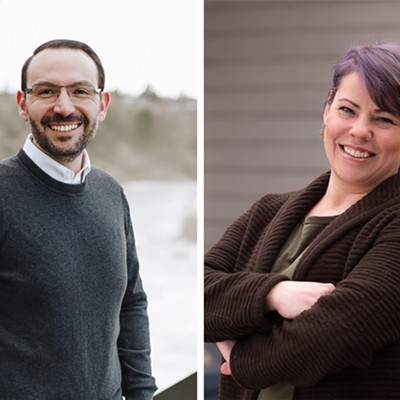At first blush, the general election in the city of Spokane Valley looks hopelessly complicated. Of the city’s seven council seats, five are up for grabs, and 10 people are vying for them. One seat has four candidates. Two have only one each.
Then there’s the strange fact that Spokane Valley mayors aren’t elected by the public but rather are City Council members who are appointed mayor by their peers. So while the current mayor is running for re-election, he’s running for re-election to the council, not necessarily the mayor’s position.
Vote for Me
How to win a City Council seat in each of Spokane’s very different districts
Regime Change
This year’s council races could shift the power balance in City Hall
Don’t Vote!
Until your read our (almost) comprehensive guide to the 2009 election
Hot Topic
The fight over Referendum 71 heats up in its last days
Comprehensive Manifesto?
A lot of the language in that “socialist” Bill of Rights is already in city documents
Us vs. Them
There are 10 candidates for five seats in Spokane Valley, but it all comes down to which of two sides you’re on
About Prop 4
The bill of rights has its head in the clouds
Our Views on the Vote
Our picks for most of the races on your ballot
Confusing, we know.
THE GIST
For all its players and spectacle, the race for City Council in Spokane Valley is actually pretty simple and can be reduced tidily to a battle between those who run the city and think it’s heading in the right direction, and an organized group of (mostly) outsider malcontents.
The latter, calling themselves the Citizens for Positive Change, have fielded five candidates to run in the election and win seats on the council: state Sen. Bob McCaslin, business owner Brenda Grassel, developer Dean Grafos, retired banker Tom Towey and sitting council member Gary Schimmels. (The latter two are running unopposed.)
Among their biggest beefs is the Sprague-Appleway Revitalization Plan, a years-long community planning effort that proposes to revamp several miles of the couplet. Friendly with disincorporation advocates (though they all say that such an action would be a last resort), the group emphasizes private enterprise and fiscal conservatism in the city.
On the other side is a loose affiliation of only-slightly-less-conservative current council members aiming to hold their seats and keep the city moving in its current direction. They are Mayor Rich Munson, Diana Wilhite (a former mayor) and Ian Robertson, a recent appointee to the council. Munson and Wilhite have been involved in city politics since incorporation in 2003 and were instrumental in the Sprague-Appleway plan.
THE MAIN EVENT
Nowhere does the collective competition between the forward-looking council members and the free-enterprise Positive Change group become more vivid than in the contest between Munson and McCaslin — one the current mayor and the other a sitting state senator who reluctantly decided to oppose him.
Naturally, Munson, who has been mayor since 2007, has little but good to say about the state of the city.
“We think the city’s done a pretty good job,” he asserts, pointing to a balanced budget, low taxation and $37 million in city reserves. (The latter he calls a “major accomplishment.”)
Not only that, but he feels the Sprague plan is a roadmap to a brighter future for the Valley. “Sprague Avenue properties … contain 40 percent of all retail space in the Valley [but] also 60 percent of all the vacancies. We don’t need the crime, we don’t need the prostitution,” he says. The SARP “is a pretty good plan for success. Rather than saying, ‘We like the way it is and we don’t want to change anything.’”
He also stresses that the plan is flexible, and 70 changes have already been made to it since going through rounds of public input.
But McCaslin is pessimistic.
“They’re spending more than they have, and they’re proposing to spend more than they have,” he says. “In 2013, according to the facts I have, they’ll be $7 million in the hole.”
Aside from what he sees as exorbitant cost for the Sprague plan, McCaslin says it puts too many limits on free enterprise. “Government needs to step aside and allow private business to expand on its own,” he argues. “They’ve got a [signage] plan that’s three-quarters of an inch thick. Like how far from the curb, how many inches up the wall. All these technical details you as a businessman have to go through for a simple thing like hanging up a sign.”
Beside all this is the obvious question: How is the 83-year-old McCaslin, who was just re-elected to his eighth state senate term in November, going to do both jobs at once?
“He’s foolish,” Munson says of McCaslin. “He has absolutely no idea the time commitment it takes. There’s no way he can do the job. Not at his age. Not with the budget situation in the state. Something’s gonna have to give. Looks to me like it would be the City Council.”
He continues, “I like Bob. I voted for him every time he’s run for office. He’s done a good job as our state senator. But he does not understand the city issues. You gotta talk to him about it for 20 minutes before he gets it. And that’s OK. He’s got other things on his mind. But I’ve been doing this for seven years. I’ve been giving it everything I’ve got. Every day. I put in 60 to 70 hours a week as mayor. I love it. And I don’t think my opponent has the capacity to do that kind of work.”
McCaslin, on the other hand, doesn’t see a problem in his double-duty, especially if his Positive Change cohorts also win election. “I’ve got a 60-day period [in the capitol], and if we get our slate in, they’ll allow me to vote from Olympia,” he says. “The Spokesman and others are saying you can’t do jobs. I think I can. Others have done it.”
Of course, there are other candidates running, too (see p. 23). But come Election Day, the most important question for Spokane Valley voters will be: Is this fledgling city growing in the right direction or not?
“I’ve knocked on 2,000 doors over the past few weeks. I can count on my hand the number of people who told me to go away,” says Munson, guessing that’s a good sign. “We’ve got a maturing large city that most people are very happy with.”




















